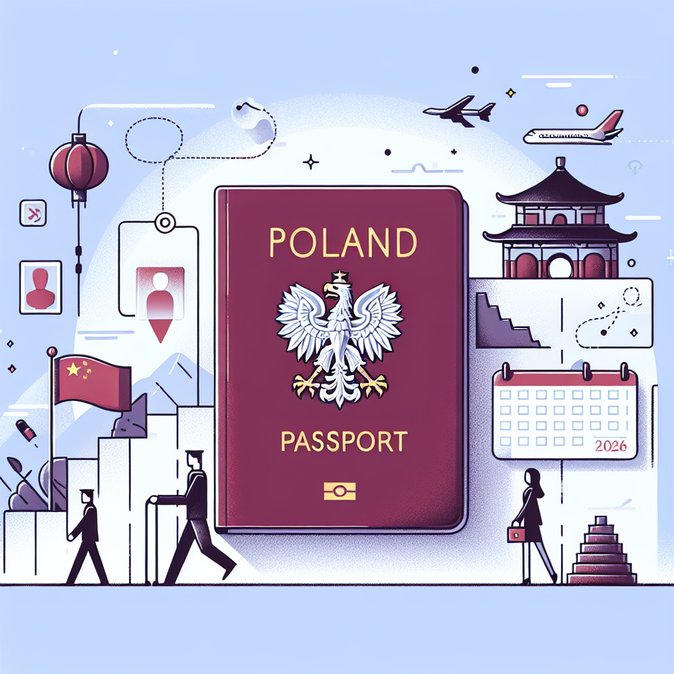
Chinese Foreign Ministry spokesperson Mao Ning announced on 3 November 2025 that Poland is among 48 countries whose nationals may now enter China visa-free for up to 30 days until 31 December 2026. The unilateral measure, publicised on social media and later confirmed by Chinese state outlets, aims to revive inbound tourism and business travel after sluggish post-pandemic numbers.
What’s new: • Polish ordinary-passport holders can make multiple 30-day trips for tourism, business meetings, family visits, or transit without obtaining an L- or M-class visa. • Stays may not be extended in-country; travellers needing longer periods must apply for the appropriate visa before departure. • The policy does not cover paid employment or study, which still require work (Z) or student (X) visas.
Context: China first trialled short visa-free entries for select EU states in 2023. Successive expansions added major EU economies and, most recently, Sweden. By including Poland—a growing source of outbound travellers and an important logistics hub on the Belt and Road rail corridor—Beijing signals its desire to deepen Central European ties.
![China Extends 30-Day Visa-Free Entry to Polish Citizens Until End-2026]()
Opportunities for Polish business: • Manufacturing sourcing tours to Shenzhen, Shanghai, and Chengdu can be organised on short notice, cutting lead-time for supply-chain audits. • Exhibition operators in Poznań and Warsaw anticipate a rebound in Chinese exhibitor attendance at major trade fairs after reciprocal easing. • LOT Polish Airlines is evaluating additional frequencies on its Warsaw–Beijing and Warsaw–Shanghai routes to capture demand.
Practical considerations: • Travellers must carry proof of onward ticket and accommodation; some airports request travel-insurance evidence. • Passport validity of at least six months is required on arrival. • Entry points include 13 mainland airports plus key seaports; land crossings via Hong Kong/Shenzhen fall under separate 144-hour rules.
Corporate mobility teams should update destination guides and booking tools to flag the new visa-free option but remind employees that 30-day stays are cumulative—serial back-to-back trips may raise scrutiny. Employers planning project rolls or equipment installation exceeding one month should default to the work-visa process.
What’s new: • Polish ordinary-passport holders can make multiple 30-day trips for tourism, business meetings, family visits, or transit without obtaining an L- or M-class visa. • Stays may not be extended in-country; travellers needing longer periods must apply for the appropriate visa before departure. • The policy does not cover paid employment or study, which still require work (Z) or student (X) visas.
Context: China first trialled short visa-free entries for select EU states in 2023. Successive expansions added major EU economies and, most recently, Sweden. By including Poland—a growing source of outbound travellers and an important logistics hub on the Belt and Road rail corridor—Beijing signals its desire to deepen Central European ties.

Opportunities for Polish business: • Manufacturing sourcing tours to Shenzhen, Shanghai, and Chengdu can be organised on short notice, cutting lead-time for supply-chain audits. • Exhibition operators in Poznań and Warsaw anticipate a rebound in Chinese exhibitor attendance at major trade fairs after reciprocal easing. • LOT Polish Airlines is evaluating additional frequencies on its Warsaw–Beijing and Warsaw–Shanghai routes to capture demand.
Practical considerations: • Travellers must carry proof of onward ticket and accommodation; some airports request travel-insurance evidence. • Passport validity of at least six months is required on arrival. • Entry points include 13 mainland airports plus key seaports; land crossings via Hong Kong/Shenzhen fall under separate 144-hour rules.
Corporate mobility teams should update destination guides and booking tools to flag the new visa-free option but remind employees that 30-day stays are cumulative—serial back-to-back trips may raise scrutiny. Employers planning project rolls or equipment installation exceeding one month should default to the work-visa process.







